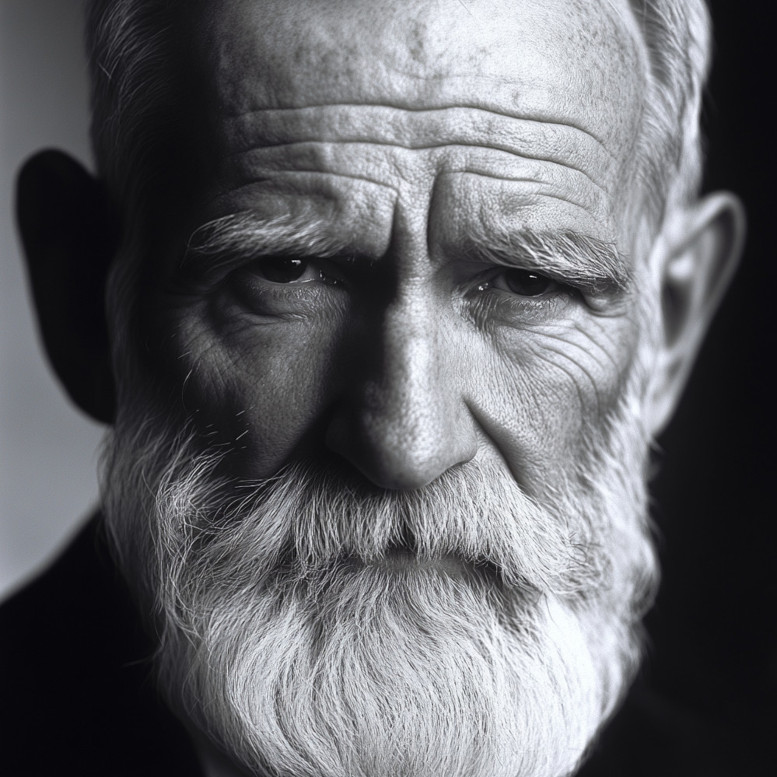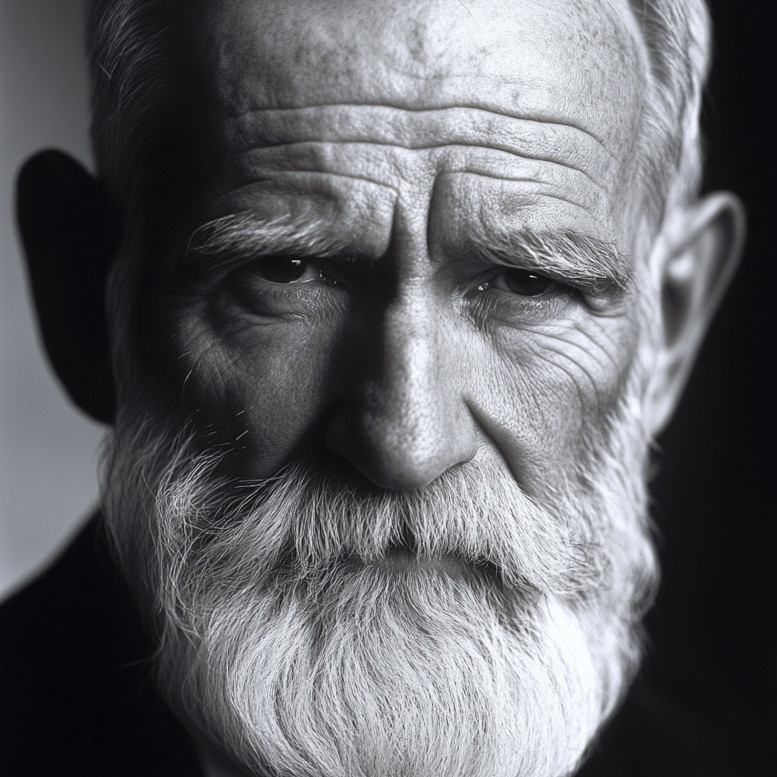


George Bernard Shaw (1856–1950) was an Irish playwright, critic, polemicist, and political activist. Widely regarded as one of the most significant dramatists in the English language, Shaw was known for his sharp wit, biting satire, and keen social commentary. He was awarded the Nobel Prize in Literature in 1925 and is best known for plays such as Pygmalion, Saint Joan, Man and Superman, and Major Barbara. Shaw's work often addressed social issues, challenging the status quo and advocating for political and social reform, particularly in the areas of poverty, education, and gender equality.
Early Life and Education
Birth and Family Background: George Bernard Shaw was born on July 26, 1856, in Dublin, Ireland, into a lower-middle-class Protestant family. His father, George Carr Shaw, was a failed grain merchant with a drinking problem, and his mother, Lucinda Elizabeth Gurly Shaw, was a professional singer and music teacher. Shaw had two older sisters, and the family lived in modest circumstances.
Education: Shaw's formal education was limited and largely unsatisfactory. He attended several schools in Dublin but found them uninspiring and later criticized the education system for its rigid and narrow focus. Shaw was largely self-educated, spending much of his youth reading voraciously in the National Gallery of Ireland. His early exposure to literature, music, and art would later inform his work as a writer and critic.
Early Career and Literary Beginnings
Move to London and Early Struggles: In 1876, at the age of 20, Shaw moved to London to join his mother and sister, who had relocated there earlier. His early years in London were marked by poverty and struggle. Shaw worked various jobs, including as a clerk and a ghostwriter, but he found little success. During this period, he began writing novels, although they were rejected by publishers. However, these early experiences helped Shaw develop his distinctive voice and sharpened his critical perspective on society.
Involvement in Socialism and the Fabian Society: Shaw became deeply interested in politics and social reform, particularly the ideas of socialism. In 1884, he joined the Fabian Society, a socialist organization that sought to advance the principles of democratic socialism through gradual and nonviolent means. Shaw became one of the society's most prominent members and a leading voice in the movement, advocating for social justice, workers' rights, and the redistribution of wealth. His political beliefs were reflected in his later plays, many of which addressed issues of class, capitalism, and social inequality.
Journalism and Criticism: Shaw began his career as a critic, writing for various newspapers and journals. He became known for his incisive and often controversial reviews, particularly as a music and theater critic. His work as a critic allowed him to develop his ideas about drama and the role of the artist in society, and it provided him with a platform to challenge conventional thinking.
Playwriting and Major Works
Transition to Playwriting: Shaw's transition from criticism to playwriting began in the late 1880s. He was determined to use the theater as a vehicle for social change, challenging audiences to think critically about the world around them. His plays were characterized by their sharp dialogue, intellectual debates, and exploration of social and moral issues.
Plays Unpleasant and Plays Pleasant (1892–1898): Shaw's early works were divided into two collections: Plays Unpleasant (1892) and Plays Pleasant (1898). Plays Unpleasant included Widowers' Houses, The Philanderer, and Mrs. Warren's Profession, which dealt with issues such as poverty, prostitution, and the hypocrisy of Victorian society. Plays Pleasant included lighter, more comedic works like Arms and the Man and Candida, which still contained Shaw's trademark social critique but were more accessible to audiences.
Major Barbara (1905): One of Shaw's most famous plays, Major Barbara explores the complex relationship between wealth, power, and morality. The play centers on Barbara Undershaft, a Salvation Army officer, and her father, Andrew Undershaft, a wealthy arms manufacturer. The play challenges the conventional notions of good and evil, questioning whether moral ends can justify immoral means.
Man and Superman (1903): Man and Superman is a philosophical play that combines elements of comedy, drama, and debate. The play addresses themes of love, marriage, and the "Life Force," a concept that Shaw used to explore the idea of creative evolution and the human drive toward self-improvement. The play's most famous section is the "Don Juan in Hell" scene, a lengthy debate about the nature of existence, morality, and the purpose of life.
Pygmalion (1913): Perhaps Shaw's most famous play, Pygmalion tells the story of Professor Henry Higgins, a phonetics expert who makes a bet that he can transform Eliza Doolittle, a Cockney flower girl, into a refined lady by teaching her how to speak properly. The play is a critique of class distinctions and explores themes of identity, transformation, and the power dynamics in relationships. Pygmalion was later adapted into the popular musical My Fair Lady.
Saint Joan (1923): Saint Joan is a historical play that tells the story of Joan of Arc, the French heroine and martyr. Shaw's portrayal of Joan is sympathetic, presenting her as a visionary who challenges the established order and is ultimately betrayed by those she seeks to serve. The play examines themes of nationalism, religion, and the conflict between individual conscience and institutional authority. Saint Joan is considered one of Shaw's greatest works and solidified his reputation as a leading dramatist.
Political Activism and Public Life
Advocacy for Socialism and Women's Rights: Throughout his life, Shaw was a vocal advocate for socialism, women's rights, and other social causes. He used his plays, essays, and public speeches to promote his ideas and challenge the status quo. Shaw believed in the power of the individual to effect change and was critical of both capitalism and organized religion, which he saw as oppressive forces.
Vegetarianism and Other Causes: Shaw was also a committed vegetarian, a belief he adopted in the 1880s and maintained throughout his life. He was an early advocate for animal rights and believed that vegetarianism was essential to a just and humane society. Additionally, Shaw was a supporter of eugenics, a belief that was common among some intellectuals of his time, though his views on the subject were complex and controversial.
Nobel Prize and Continued Influence: In 1925, Shaw was awarded the Nobel Prize in Literature for his contributions to drama and literature. He initially declined the monetary award, stating that he had no need for it, but later accepted it and used the funds to establish a trust to support the development of the Swedish language. Shaw's influence continued to grow throughout the 20th century, and his works were performed and studied worldwide.
Later Life and Legacy
Final Years: Shaw remained active as a writer and public figure well into his later years. He continued to write plays, essays, and letters, although his later works were less influential than his earlier ones. Shaw lived to the age of 94, dying on November 2, 1950, after a fall in his garden. Despite his advanced age, Shaw remained intellectually active and engaged with the world until the end of his life.
Legacy: George Bernard Shaw's legacy as a playwright, critic, and social commentator is vast and enduring. His works continue to be performed and studied for their brilliant wit, intellectual rigor, and social relevance. Shaw's plays challenged audiences to think critically about the world and their place in it, and his influence can be seen in the works of later dramatists, including Bertolt Brecht and Harold Pinter.
Shaw's contributions to literature and theater were not limited to his plays; his essays and prefaces, in which he expounded on his views on politics, society, and the role of the artist, remain important texts in the study of drama and social thought. His commitment to social justice, his advocacy for the rights of women and the working class, and his critique of capitalism and organized religion continue to resonate in contemporary discussions of these issues.
Shaw's Enduring Popularity: Shaw's plays, particularly Pygmalion and Saint Joan, have become classics of the English-speaking theater and are regularly performed around the world. The success of My Fair Lady, based on Pygmalion, introduced Shaw's work to an even wider audience, ensuring that his ideas and characters remain part of popular culture.
George Bernard Shaw was a towering figure in the world of literature and theater, whose works have left a lasting impact on both art and society. His sharp wit, incisive social commentary, and commitment to challenging the status quo made him one of the most influential writers of the 20th century. Shaw's legacy as a playwright, critic, and social reformer continues to inspire and provoke thought, ensuring that his voice remains relevant in discussions of art, politics, and human rights.

We use cookies
We use cookies and other tracking technologies to improve your browsing experience on our website, to show you personalized content and targeted ads, to analyze our website traffic, and to understand where our visitors are coming from. Privacy Policy.